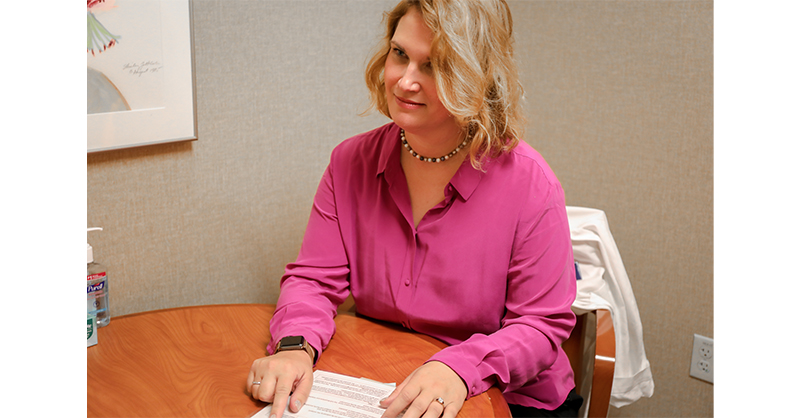
Maria Rodriguez, MD, MPH, professor of obstetrics and gynecology at OHSU School of Medicine, discusses mental health resources for patients. In a new study, OHSU researchers reveal significant disparities in maternal mental health among low-income immigrants who don't qualify for Medicaid coverage, which is available when states expand the program. . (OHSU/Kristin Torres Hicks)
Oregon Health & Science University researchers highlight disparities in maternal mental health care among low-income immigrants and address mental health conditions new parents face during the perinatal period in new study To do this, we are calling on more states to expand access to Medicaid. time before and after birth.
This study, published yesterday, JAMA network openfound that expansion of Medicaid benefits to include prenatal and immediate postnatal care was associated with significant increases in the detection and treatment of mental health conditions related to pregnancy and childbirth.
Medicaid is a public insurance program that provides health insurance to low-income families and individuals, serving more than 90 million people in the United States. Due to a variety of socioeconomic factors, Medicaid recipients have multiple risk factors for prenatal and postnatal mental health conditions and face unique barriers to accessing care.
However, for some low-income women, access to pregnancy care is not guaranteed through Medicaid based on their immigration status.
States have the option to expand emergency Medicaid coverage for prenatal and postnatal care, but many states have not expanded coverage. Currently, Oregon is one of only 18 states offering these benefits. Because Medicaid is the largest payer for obstetric care in the United States, this lack of coverage leaves many people without the critical and sometimes life-saving care they need.
“Poor perinatal mental health is a significant contributor to the maternal health crisis facing the United States, and for immigrants, lack of access to care contributes to a multigenerational cycle of poor health and inequality.” ,” he said. Maria Rodriguez, MD, MPH; Professor of Obstetrics and Gynecology at OHSU School of Medicine, Director of the OHSU Center for Reproductive Health Equity, and corresponding author of this study.
“We know that mental health during pregnancy is absolutely critical, not only to prevent maternal morbidity and mortality, but also to improve the quality of life for pregnant women, babies and their families. ” Rodriguez continued. “This study shows that access to care can have a positive impact on this all-too-often overlooked population.”
Expanding mental health care
In a cohort study that analyzed birth data for nearly 44,000 emergency Medicaid recipients, researchers found that Oregon provides coverage to pregnant women through emergency Medicaid, while others only cover emergency conditions and hospitalizations. We compared the results for South Carolina. Researchers found that expanding Medicaid coverage to include prenatal care was associated with a significant increase in the detection and treatment of prenatal or postnatal health conditions. Furthermore, a similar association was found for increased coverage after birth.
Common mental health conditions before and after birth include depression, anxiety disorders, and postpartum psychosis. Among immigrants, the prevalence of postnatal depression alone is estimated to be between 46% and 60%. Early detection and effective management of symptoms, especially within the first three months of life, are key to recovery. However, there are systemic and societal challenges to detecting and treating this population.
“Immigrants in the United States don't necessarily have a social or family support network, but we know that it's very important, especially during childbearing years,” Rodriguez said. “At a vulnerable time like this, it is even more important to be able to diagnose and treat mental health concerns.”
Looking forward, Rodriguez said additional research and efforts will include identifying culturally appropriate tools to screen for mental health in immigrant populations and identifying interventions that best support individuals in need of care. He said that the focus should be on
“Our hope is that not only will immigrants have access to care, but that care will be delivered in a way that responds to patients' cultural, social and linguistic needs, and that patients will be more tolerant of treatment. '' Rodriguez said. “Regardless of their background or immigration status, all parents deserve the support and care they need to stay healthy when welcoming and caring for a new child.”
This research was supported by award number R01MD013648 from the National Institute on Minority Health and Health Disparities of the National Institutes of Health. This work is solely the responsibility of the authors and does not necessarily represent the official views of the National Institutes of Health.


